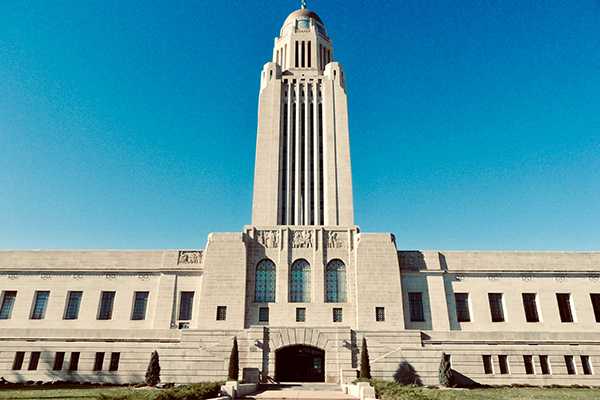
On June 6, Nebraska Governor Jim Pillen approved Legislative Bill 50 (LB 50), comprehensive justice reform legislation to improve public safety and system outcomes while containing corrections costs. LB 50 is the culmination of the state’s Justice Reinvestment Initiative (JRI), a bipartisan, interbranch effort to understand justice system issues and advance data-driven solutions.
The Crime and Justice Institute (CJI)—funded by the Bureau of Justice Assistance (BJA), a component of the Department of Justice Office of Justice Programs, Arnold Ventures, and The Pew Charitable Trusts—assisted state leaders in analyzing corrections data, assessing decision-making throughout the justice system, and developing recommendations for policy and practice changes ultimately translated into LB 50.
“State leadership met the crisis in Nebraska’s corrections system head-on through data-driven policies that are smart on crime,” said Len Engel, CJI’s Director of Policy & Campaigns. “LB 50 prioritizes public safety and recidivism reduction while opening the door for further improvements down the road.”
Task Force Process & Findings
In April 2021, leaders from all three branches of government convened the Nebraska Criminal Justice Reinvestment Working Group (Working Group), charged with using justice system data and criminological research to develop comprehensive recidivism-reduction strategies and shifting resources toward more cost-effective public safety strategies. The Working Group met over a six-month period to analyze data from Nebraska’s criminal justice agencies, review current research on sentencing, corrections, and supervision practices, and develop policy options.
The Working Group’s review and subsequent follow-up found that:
- Nebraska’s acute prison overcrowding is the worst in the nation as of 2020, with six out of ten prisons at over 120% of operational capacity in early 2021
- Admissions to state prisons grew by 11% from 2015 to 2019, with more than half of initial prison admissions for non-person, non-sex offenses in 2020
- The length of time people incarcerated in Nebraska prisons are staying has increased 38% in the last decade
- Parole grant rates decreased dramatically from 2018 to 2020, dropping 20 percentage points
- 40% of people revoked from parole in 2020 were revoked due to technical violations (i.e., not new crimes), highlighting the importance of sustained investment in community-based treatment resources to address the behavioral health needs of people involved in the justice system
These trends came at a great cost to Nebraska taxpayers, with corrections expenditures growing over 50% since 2011 to more than a quarter-billion dollars in 2020. Despite this significant investment, recidivism rates increased, with 30 percent of those released in 2018 returning to prison, up 4 percentage points from 2008.
Policy Option Recommendations
The Task Force released a comprehensive package of 21 criminal justice policy options, 17 receiving unanimous consent, designed to:
- Focus corrections resources on violent and high-risk individuals
- Address regional inconsistency in outcomes across the state
- Minimize barriers to successful re-entry
- Improve state-wide behavioral health supports
- Ensure sustainability of the reforms
National Justice Reinvestment Grows Nationally
Nebraska joins a growing list of states, including Georgia, Mississippi, Nevada, and Utah, that have used a justice reinvestment strategy to get smart on crime, adopting policies that reduce the unnecessary use of incarceration and increase public safety by reducing recidivism. These states have revised policies to focus on individuals engaged in chronic and violent criminal behavior and invested in more effective and less costly strategies to reduce recidivism, address gaps in victims’ services, and improve public safety.
Read a summary of LB 50 here.